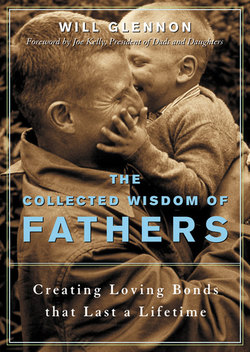Читать книгу The Collected Wisdom of Fathers - Will Glennon - Страница 7
На сайте Литреса книга снята с продажи.
ОглавлениеIntroduction
When I first undertook to pull together the material for the first edition of this book, I was motivated simply by the discovery that no other book on the subject directly represented the voices and experiences of real fathers. Every other book I had found out there was written by some sort of “expert” (usually a therapist or clergy). As a man, I knew that men don't take easily to being told by experts how to do things, particularly things as important as being a father. And, as a father who had to struggle alone through learning about being a father, I also knew that there was no such thing as an “expert” in this area—there was only a very large pool of dads in various stages of training, all learning and making their own mistakes, largely in isolation from each other.
What I wanted to do was talk to as many fathers as I could to try to glean the best and most important lessons we had learned and turn that into something like the collective wisdom of fathers. The process itself was an extraordinarily powerful one. In my twentysomething years of being a father, I don't think I'd ever talked to another man to share experiences around fatherhood, and now all of the sudden I was deep into hours-long discussions with more than 150 dads. Not surprisingly, but increasingly poignant, father after father told me that our interview was the first time they had ever had this conversation.
Although talking about the kids and problems or issues in dealing with them is one of the first topics women dive into, we men rarely if ever get around to it at all, and that turns out to be a real tragedy. The wealth of knowledge and wisdom about this most difficult of all jobs is out there in abundance. Unfortunately we acquire this wisdom by stumbling around making mistake after mistake until we finally get it right, by which time our beautiful resilient children are all grown up. Then all that hard-won knowledge sits silently in the backs of our. minds as we watch the newest generation of fathers stumble along the same path we did.
One of the most moving lessons I learned when interviewing all those fathers was how unbelievably deeply they loved their children. As the saying goes, big boys don't cry, and men certainly don't, yet in well over half the interviews the dads at some point broke down in tears. Tears of pain, tears of shame, tears of frustration, tears of love so strong it hurt, just a pure deep flood of overwhelming emotion. At the same time I was struck by how frighteningly often these loving men simply did not know how to translate that love in a way that their children really received it, and how often our instincts as men was to do the exact wrong thing. Fathering is not a role we are well prepared for, and until and unless we start talking to one another we will simply learn our lessons the hard way and leave a tragic trail of open wounds behind us.
At the core of this most difficult undertaking is the simple fact that childhood is almost entirely an emotional experience, and as a product of growing up male in American culture, most new fathers are relatively challenged in the world of emotions. It can make for a devastating combination, with dads constantly (and desperately) trying to respond to their children's emotional pleas with logic and solutions, when what they need from him is a powerfully felt and articulated emotional bond.
In the nine years since the first edition was published, many things have changed, and unfortunately many have not. The most exciting development is that more new fathers are diving into the experience of childrearing and exploring how to get more fully and deeply engaged in the lives of their children. Equally exciting is the beginnings, at least, of an awareness that, for everyone's sake, we absolutely must begin raising our sons to be well-integrated, emotionally intelligent men, so that when their turn comes to assume the awesome mantle of fatherhood, they will have at hand all the internal resources they need.
On the other hand, the deeper changes that need to emerge, with young men learning to be fully emotionally conscious and articulate, are happening at a snail's pace. The result is another whole generation of fathers trying to go it alone and reinvent one of the oldest jobs in the world. Generation after generation, our knowledge base in nearly every area has deepened and expanded because we talked about what we knew and passed it on; yet in this, the single most sacred place in a man's life, we remain silent. Fathers need to start talking amongst themselves and sharing the wisdom and lessons they have accumulated.
Nine years later, this is still the only book available that truly represents fathers' voices in what is a beginning of that dialogue. So, to all new or soon-to-be fathers, I encourage you to read and learn from our mistakes, then pass this book on to a new father you know. And while you're at it, pass on your own experiences as well.
